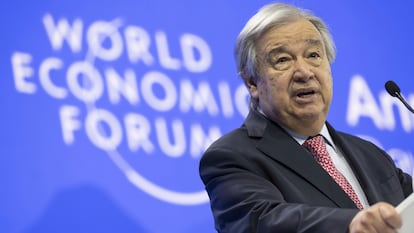The dangers of a broken world order shake up the Davos Forum
UN Secretary-General António Guterres warns of growing impunity, and the head of the Atomic Energy Agency denounces the expansion of nuclear arsenals


The upheavals of the world order caused by the clashes between powers and ineffective global governance were the main focus of the World Economic Forum in Davos, Switzerland, on Wednesday. A perfect storm of violations of the principle of territorial integrity and human rights, and an abrupt weakening of international institutions is brewing in the international community. UN Secretary General António Guterres described one of the key dangers as follows: “Geopolitical divisions are deep and this leads to a situation of impunity. The truth is that everywhere, everyone thinks they can do whatever they want and nothing will happen to them.”
The U.S. withdrawal from organizations such as the World Health Organisation (WHO) and mechanisms such as the Paris Agreement is a further blow to a turbulent international framework, the consequences of which are causing concern. In his speech, Guterres pointed out that nuclear conflict is not the only existential threat, citing climate change and the uncontrolled development of artificial intelligence. In both cases, there are no promising signs of governance.
The head of the International Atomic Energy Agency, Rafael Mariano Grossi, expressed his concern about the race to expand nuclear arsenals in a meeting with a group of international journalists. “I see the potential for a very serious erosion of the non-proliferation regime. Everyone seems to be increasing their nuclear arsenals, forgetting that there is a commitment to reduce them [under the Nuclear Non-Proliferation Treaty]. And when I say everyone, I mean everyone, including China, which has always been a champion of nuclear disarmament.”
Grossi also warned that Iran is “stepping on the accelerator” in the development of its nuclear program. In his speech, Guterres urged the Iranian authorities to make it clear that they are not seeking to develop nuclear weapons, in a context of limited surveillance capacity after Donald Trump broke the agreement that offered better control instruments during his first term in the White House. Iran’s vice president for strategic affairs, Mohamed Javad Zarif, again assured in Davos that Tehran is not seeking the bomb. But at the forum, concern was evident among experts about the widening differences between factions in Iran: those who advocate nuclear capabilities as a guarantee in the current situation of extreme weakness and those — like Zarif — who are more in favor of negotiating with the West.
Another central element of the informal discussions and conversations in Davos is the prospect of negotiations to stop hostilities in Ukraine. Trump’s promise to end the conflict within 24 hours has proven to be unfounded. The forum’s interest was focused on discerning multiple wills: Vladimir Putin’s to settle for a result less than the total subjugation of Ukraine; Trump’s to really increase the pressure for the Russian leader to reach that conclusion; and Europe’s to take on a relevant part of the guarantees necessary to sustain an eventual ceasefire by deterring future attacks. Trump threatened Putin on Wednesday with tougher sanctions if he does not end his offensive, but there is a long way between words and effective reality. In all of this, the UN is completely out of the picture, in an exercise that is a pure game of power.
The World Trade Organization (WTO) is also completely toothless on the eve of what is shaping up to be an escalation of trade conflicts. Experts consider it unlikely that Trump will shy away from implementing a campaign promise that has been central to his path back to the White House. Action and reaction will unfold in an umpireless terrain, as the WTO arbitration panel has been deactivated by the U.S. refusal to renew members whose mandate has already expired.
At the same time, international justice is suffering from serious issues of effectiveness, with countries refusing to comply with the mandatory nature of arrest warrants (such as Mongolia with Putin) or with rulings (such as China in the case of its maritime dispute with the Philippines, or Israel in the precautionary requirements in its offensive on Gaza).
The picture is further complicated by the role of social media platforms in democracies, with the openly manipulative actions of Elon Musk and the maneuvers of Mark Zuckerberg. In this regard, Spanish Prime Minister Pedro Sánchez advocated that the owners of these networks be held criminally responsible for the content that is disseminated through them. An attempt to limit the space for impunity to which Guterres referred in his speech.
Sign up for our weekly newsletter to get more English-language news coverage from EL PAÍS USA Edition
Tu suscripción se está usando en otro dispositivo
¿Quieres añadir otro usuario a tu suscripción?
Si continúas leyendo en este dispositivo, no se podrá leer en el otro.
FlechaTu suscripción se está usando en otro dispositivo y solo puedes acceder a EL PAÍS desde un dispositivo a la vez.
Si quieres compartir tu cuenta, cambia tu suscripción a la modalidad Premium, así podrás añadir otro usuario. Cada uno accederá con su propia cuenta de email, lo que os permitirá personalizar vuestra experiencia en EL PAÍS.
¿Tienes una suscripción de empresa? Accede aquí para contratar más cuentas.
En el caso de no saber quién está usando tu cuenta, te recomendamos cambiar tu contraseña aquí.
Si decides continuar compartiendo tu cuenta, este mensaje se mostrará en tu dispositivo y en el de la otra persona que está usando tu cuenta de forma indefinida, afectando a tu experiencia de lectura. Puedes consultar aquí los términos y condiciones de la suscripción digital.








































